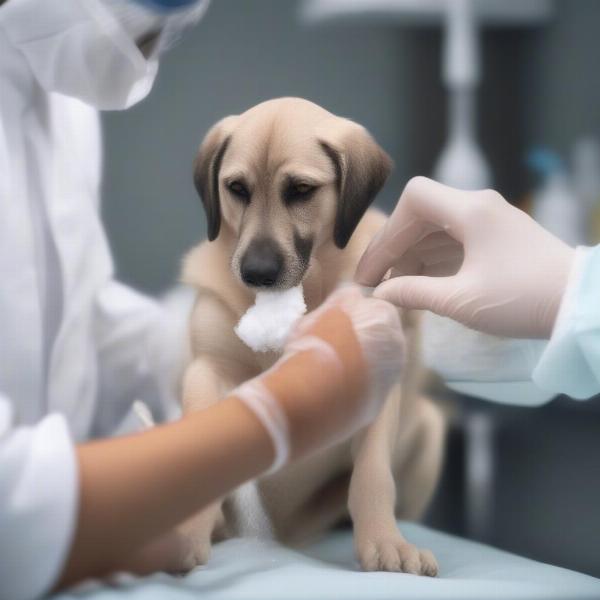Germolene is a common antiseptic ointment used by many for minor cuts and scrapes. But can you put Germolene on dogs? The short answer is no. While it might seem like a harmless solution for your furry friend’s minor wounds, Germolene contains ingredients that are toxic to dogs if ingested. This article will explore why Germolene is unsafe for dogs, what to do if your dog licks it, and safe alternatives for treating your dog’s minor injuries.
Why Germolene is Not Safe for Dogs
Germolene, and similar antiseptic creams formulated for human use, contain ingredients that can be harmful to dogs. The primary concern is zinc oxide, present in most formulations of Germolene. Zinc is toxic to dogs and can cause serious health issues if ingested, even in small amounts. Symptoms of zinc toxicity include vomiting, diarrhea, lethargy, loss of appetite, and in severe cases, even anemia and liver damage. Another ingredient, phenol, although present in smaller quantities, also poses risks to dogs.
What to Do if Your Dog Licks Germolene
If you suspect your dog has licked or ingested Germolene, contact your veterinarian immediately. The sooner you seek veterinary advice, the better the outcome for your dog. Do not induce vomiting unless specifically instructed by your vet. Be prepared to provide information about the amount of Germolene your dog may have ingested, as well as any symptoms they are exhibiting.
Safe Alternatives for Treating Minor Wounds in Dogs
Thankfully, there are several safe and effective alternatives to Germolene for treating your dog’s minor cuts, grazes, and abrasions.
- Veterinary Antiseptics: Your vet can recommend antiseptic solutions specifically formulated for dogs. These products are safe if licked and effectively cleanse the wound.
- Saline Solution: A simple saline solution (saltwater) can be used to clean minor wounds. Mix one teaspoon of salt with a pint of warm water and gently cleanse the affected area.
- Antibacterial Sprays and Ointments for Pets: Several pet-safe antibacterial sprays and ointments are available at pet stores and online. Look for products specifically designed for dogs.
 Cleaning a dog's wound with saline solution
Cleaning a dog's wound with saline solution
How to Prevent Your Dog from Licking Wounds
Preventing your dog from licking their wounds is crucial for proper healing. Here are a few effective strategies:
- Elizabethan Collar (E-collar): Commonly known as the “cone of shame,” an E-collar prevents your dog from reaching the wound.
- Bandages: Covering the wound with a bandage can help deter licking and protect it from further contamination.
- Bitter Spray: Apply a bitter-tasting spray around the wound. The unpleasant taste will discourage your dog from licking.
- Distraction: Keeping your dog entertained with toys, puzzles, and other activities can help divert their attention away from the wound.
Is Germolene Toxic to Dogs if Ingested?
Yes, Germolene is toxic to dogs if ingested due to the zinc oxide content. Even small amounts can cause significant health problems. Seek immediate veterinary attention if your dog ingests Germolene.
What are the Signs of Zinc Toxicity in Dogs?
Signs of zinc toxicity in dogs can include vomiting, diarrhea, lethargy, loss of appetite, jaundice, and in severe cases, anemia and liver damage.
What Should I Use Instead of Germolene on My Dog?
Use veterinary-approved antiseptics, saline solution, or pet-safe antibacterial sprays and ointments instead of Germolene on your dog.
Can I Use Human Antiseptic Cream on My Dog?
No, avoid using human antiseptic creams on your dog as they often contain ingredients toxic to them.
How Can I Stop My Dog from Licking a Wound?
Use an Elizabethan collar, bandages, bitter spray, or distractions to prevent your dog from licking a wound.
Expert Insights from Dr. Emily Carter, DVM:
“Never use human medications on your pets without consulting a veterinarian. What might be safe for humans can be extremely harmful to animals.”
“Always keep human medications out of reach of your pets. Curiosity can lead to accidental ingestion and potentially serious health consequences.”
Conclusion: While Germolene is a common household antiseptic for humans, it is not safe for dogs. The zinc oxide present in Germolene is toxic to dogs and can cause various health issues if ingested. If your dog has a minor wound, opt for safe alternatives like veterinary-approved antiseptics, saline solution, or pet-safe antibacterial products. Always consult your veterinarian if you are unsure about the best course of treatment for your furry friend. Don’t risk your dog’s health by using human medications on them.
Suggested Further Reading on ILM Dog:
- (If relevant articles exist, insert links here)
About ILM Dog:
ILM Dog is your trusted source for expert advice on dog care, providing valuable insights into breeds, health, training, nutrition, grooming, and much more. We’re dedicated to helping dog owners worldwide provide the best possible care for their furry companions. Whether you’re a new dog owner or a seasoned expert, ILM Dog offers practical, reliable information to enhance your dog’s well-being. Contact us at [email protected] or +44 20-3965-8624 for personalized advice.